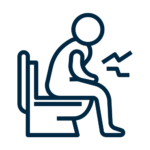What do persistent stomach aches and abdominal pain mean?
Learn about the causes of stomach aches and abdominal pain and what you can do about it.
What do persistent stomach aches and abdominal pain mean?
Learn about the causes of stomach aches and abdominal pain and what you can do about it.
Abdominal pain and stomach aches are often used interchangeably and often refer to the same type of issue.
They can be caused by several issues, ranging from something as simple as gas or bloating to more serious conditions such as Crohn’s disease or IBS in adults.
Abdominal pain can be felt anywhere between the chest and pelvic region of your body. It may feel generalised, localised, and have several different sensations.
Identifying where you feel the pain from and what sensation it is can help figure out what is causing the issue.

Abdominal pain and stomach aches are often used interchangeably and often refer to the same type of issue.
They can be caused by several issues, ranging from something as simple as gas or bloating to more serious conditions such as Crohn’s disease or IBS in adults.
Abdominal pain can be felt anywhere between the chest and pelvic region of your body. It may feel generalised, localised, and have several different sensations.
Identifying where you feel the pain from and what sensation it is can help figure out what is causing the issue.

Types of abdominal pain

There are different classifications of abdominal pain as not all abdominal pain is the same.
For instance, acute abdominal pain is where you experience discomfort for less than a week.
Meanwhile, chronic abdominal pain is classified as constant or recurring for 3 months or more.
Progressive abdominal pain is a pain that gets worse over time, with other symptoms manifesting as the abdominal pain progresses. This type of pain is often a sign of an underlying condition.
These classifications alone, however, are not enough to understand the root cause of your stomach aches and abdominal pain, as several gastrointestinal and systemic disorders can lead to these issues.
There are different classifications of abdominal pain as not all abdominal pain is the same.
For instance, acute abdominal pain is where you experience discomfort for less than a week.
Meanwhile, chronic abdominal pain is classified as constant or recurring for 3 months or more.
Progressive abdominal pain is a pain that gets worse over time, with other symptoms manifesting as the abdominal pain progresses. This type of pain is often a sign of an underlying condition.
These classifications alone, however, are not enough to understand the root cause of your stomach aches and abdominal pain, as several gastrointestinal and systemic disorders can lead to these issues.



Where is the pain located and what does it feel like?
Pinpointing a location and a sensation of your abdominal pain can help narrow down the cause.
You can have a generalised pain, which is felt throughout the abdominal region, or a localised pain, which is limited to a specific area of the abdomen. Localised pain is often caused by problems in a particular organ.
Your pain can also be described as an ache, a cramp, a dull pain, an intermittent pain, or a sharp pain.



Where is the pain located and what does it feel like?
Pinpointing a location and a sensation of your abdominal pain can help narrow down the cause.
You can have a generalised pain, which is felt throughout the abdominal region, or a localised pain, which is limited to a specific area of the abdomen. Localised pain is often caused by problems in a particular organ.
Your pain can also be described as an ache, a cramp, a dull pain, an intermittent pain, or a sharp pain.



What are the main causes of stomach aches and abdominal pain?
Many different conditions can cause abdominal pain.
In most cases, abdominal pain is a result of something not very serious and can be resolved easily after consulting a medical health professional.
The main causes of abdominal pain include:


An infection


Abnormal growths


Inflammation


Obstruction


Intestinal disorders


Diseases that affect the organs in the abdomen, such as GORD, IBS and Crohn’s disease
Other common causes include:


Constipation


Diarrhoea


Stomach flu


Acid reflux


Vomiting


Stress
When should you seek medical care?
Regardless of the cause of abdominal pain, it’s important to seek treatment as your doctor will be able to pinpoint the issue and administer the correct treatment.
You should make an appointment with your doctor as soon as possible if you experience the following symptoms:
- Abdominal pain that lasts longer than 24 hours
- Prolonged constipation
- Vomiting
- Fever
- Loss of appetite
- Unexplained weight loss
Your doctor may ask you a series of questions about your pain and your medical history, perform a physical examination, and even carry out a few tests to help figure out what is causing your persistent stomach aches and abdominal pain.


Regardless of the cause of abdominal pain, it’s important to seek treatment as your doctor will be able to pinpoint the issue and administer the correct treatment.
You should make an appointment with your doctor as soon as possible if you experience the following symptoms:
- Abdominal pain that lasts longer than 24 hours
- Prolonged constipation
- Vomiting
- Fever
- Loss of appetite
- Unexplained weight loss
Your doctor may ask you a series of questions about your pain and your medical history, perform a physical examination, and even carry out a few tests to help figure out what is causing your persistent stomach aches and abdominal pain.


When to see a doctor
You should seek medical attention if your discomfort has lasted for more than a few days. This can help diagnose the issue and to receive appropriate treatment.
Upon your visit to the hospital, your doctor may ask about your symptoms and perform a physical exam or an X-ray.
In certain cases, an endoscopy may be performed. This is a procedure that will allow your doctor to look inside your stomach with a tube and a small camera.
Speak with a gastrointestinal specialist
At Sydney Gut Clinic, we have a team of specialists who specialise in diagnosing and treating a range of gastrointestinal conditions.
Don’t hesitate to reach out and schedule a consultation with a specialist today to find relief from abdominal pain.
Sydney Gut Clinic services are only available to patients in Australia.
FAQ
When should I see a doctor if my stomach discomfort and aches don't go away?
It is crucial to get quick medical help if your abdomen discomfort is severe, getting worse, or chronic. If the discomfort is accompanied by other alarming symptoms, such as fever, vomiting, bloody stools, breathing difficulties, or dehydration, get immediate medical attention.
How is the root cause of ongoing abdominal and stomach pain identified?
A detailed medical history, physical examination, and occasionally imaging (such as an ultrasound or CT scan) or laboratory testing (such as blood tests or stool analyses) are used to diagnose persistent stomach pains and abdominal pain. To view the digestive system, an endoscopy or colonoscopy may occasionally be used.
Can stomach aches and abdominal pain from stress or worry last for a long time?
Yes, tension and stress can cause or make abdominal and stomach pain worse. Due to the gut-brain link, emotional distress can cause discomfort by taking the form of gastrointestinal symptoms.
Is it possible that ongoing stomach pains could be an indication of cancer?
Some cancers, including stomach, pancreatic, and colorectal cancerous growths, can cause persistent stomach pain as a symptom. It’s important to keep in mind that several non-cancerous illnesses can also produce comparable symptoms, so a thorough medical examination is required to identify the cause.









